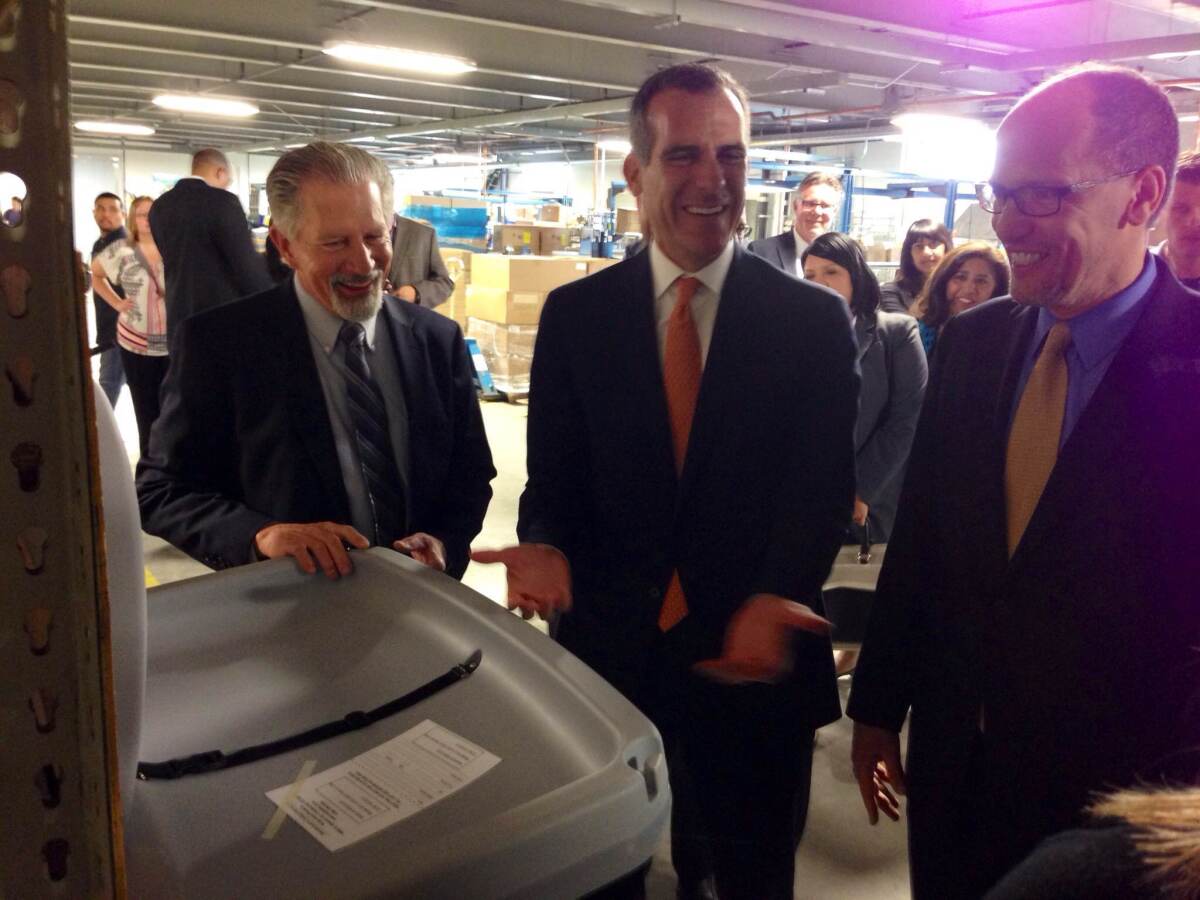Perez and Garcetti take aim at wage theft, minimum wage

Raising the minimum wage is one thing, but enforcing it is another.
Los Angeles Mayor Eric Garcetti and U.S. Secretary of Labor Thomas Perez stressed that point at a pair of events coinciding with Cesar Chavez Day.
The two politicians visited a North Hollywood manufacturer and a downtown Los Angeles church Tuesday morning to stump for higher pay for Angelenos and better awareness of wage theft by employers.
At Bobrick Washroom Equipment Inc., a family-owned company that makes Koala Kare diaper changing stations and other bathroom products, Perez said that 2014 was the best year for job growth nationwide since the late 1990s.
“You don’t need to be a math whiz to know the odds of getting a job and punching your ticket to the middle class are much better,” he said after a short tour of Bobrick’s new facility.
But pockets of poverty persist in cities, in part, because of low wages, he said. On Tuesday, Los Angeles County supervisors voted 5 to 0 to study the possible effects of boosting wage floors at the county level.
City leaders in Los Angeles are considering an increase in the minimum wage to $13.25 or $15.25 an hour from the state minimum of $9 an hour.
Many business leaders have decried the efforts, saying that forcing employers to pay workers more will make Los Angeles less attractive to entrepreneurs. But some companies, such as Bobrick, said they support the move because it will balance out the region’s high cost of living.
At the Plaza United Methodist Church downtown, Perez told more than 100 supporters of higher minimum wages that the Labor Department was stepping up its actions against those employers who commit so-called wage theft.
Wage theft is the withholding of earnings and benefits from workers, often by refusing legally mandated rest or meal breaks, skipping overtime pay or undercutting the minimum wage by paying in cash.
Perez cited a UCLA study that found that wage theft siphons more than $1 billion from low-wage local workers each year.
The Labor Department’s roster of wage theft investigators, he said, has swelled in recent years. State and local government entities also help out, serving as much-needed “redundancies in law enforcement,” Perez said.
The agencies also work with local nonprofits, religious leaders and other “trust emissaries” in the community to gain worker trust, he said.
“I’m telling anyone who cheats: There are a lot of cops on the streets, and we’re going to throw the book at you,” Perez said.
California Labor Commissioner Julie Su described how such violations also harm legitimate businesses, which can’t compete when unscrupulous employers outbid them for contracts or undercut the prices for their products and services.
The perpetrators of wage theft often evade prosecution by hiding behind shell companies, Su said. She urged enforcement agencies to pursue offenders aggressively rather than allowing individual workers to try to collect settlements.
“This is one of the big challenges in combating wage theft,” she said.
Racetrack worker Jose Guillermo Lopez, 48, spoke through a translator about his experience working 12 hours a day while supporting a wife and two children. He sued his employer and was awarded a $20,900 judgment two years ago.
He said he has yet to see a penny.
“I have seen zero,” he said. “The business keeps going on.”
Twitter: @tiffhsulatimes
More to Read
Inside the business of entertainment
The Wide Shot brings you news, analysis and insights on everything from streaming wars to production — and what it all means for the future.
You may occasionally receive promotional content from the Los Angeles Times.











